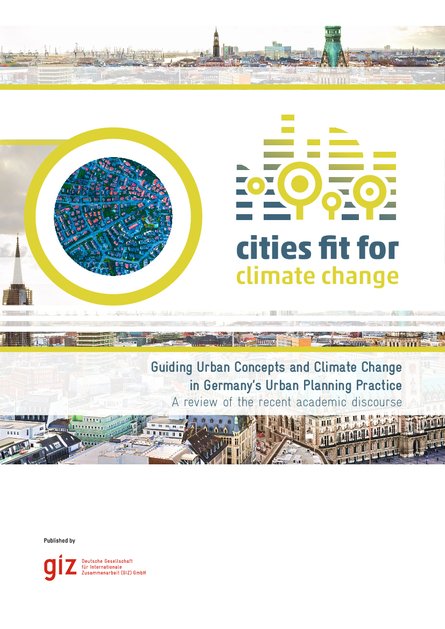
Reacting to unprecedented climate change, German cities have initiated projects, strategies and instruments that aim at making urban planning and related investments resilient to climate impacts while at the same time promoting low-carbon development. In that regard, there is a need for defining specific ways to translate climate change adaptation and mitigation policies into practical urban planning approaches. This effort is supported by overarching guiding urban concepts for urban planning that incorporate climate aspects by providing a framework and vision for the development of a city.
To that end, the Cities Fit for Climate Change (CFCC) project commissioned the study “Guiding Urban Concepts and Climate Change in Germany’s Urban Planning Practice” to shed light on the academic discourse on the various existing guiding concepts in Germany and how they are applied in the context of climate-proof urban development. Concretely, this is done by analysing to what extent guiding concepts are part of research within the German academic landscape and to what extent they incorporate theoretical approaches such as sustainability and resilience, with a view to interlinking urban and spatial development with responses to climate change.
The Cities Fit for Climate Change (CFCC) project is implemented by the Deutsche Gesellschaft für Internationale Zusammenarbeit (GIZ) GmbH on behalf of the Federal Ministry for the Environment, Nature Conservation and Nuclear Safety (BMU). This project is part of the International Climate Initiative (IKI). The Federal Ministry for the Environment, Nature Conservation and Nuclear Safety (BMU) supports this initiative on the basis of a decision adopted by the German Bundestag.
Links
Resource collections
- Climate emergency
- Topics
- UN Habitat - Urban Response Collection
- Urban Response - Urban Crisis Preparedness and Risk Reduction
- Urban Response Collection - Community Engagement and Social Cohesion
- Urban Response Collection - Economic Recovery
- Urban Response Collection - Environment and Climate Change
- Urban Response Collection - Housing, Land and Property
- Urban Response Collection - Urban Crisis Response, Recovery and Reconstruction
- Urban Response Collection - Urban Resilience
